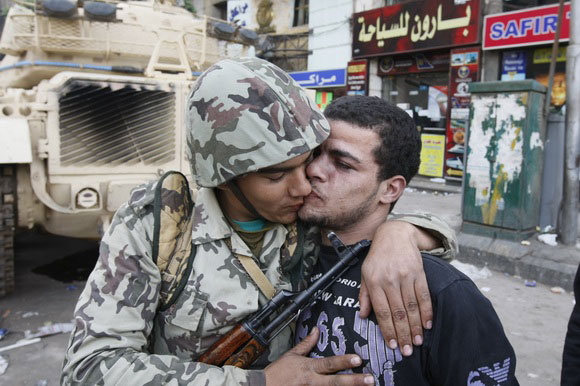
a complicated relationship*
Egyptians have a complicated relationship with the army. While we are told over and over that it occupies a high status within Egyptian society, largely because of perceived (early) success in the Yom Kippur War, if we take a longer look, it's clear that it has a problematic history when it comes to the welfare of the Egyptian people. Today as well, while vaunted for its restraint over the last two weeks, the army has not been truly impartial.
While we are still awaiting events, even in a first draft, the 2011 Egyptian Revolution may already be writing the most definitive statement of the army's position within Egyptian society.
We've been hearing for weeks that the enemy of the popular protests isn't the army, that the army is close to the people, that the army would not turn on the people, and that the conscripts, at the very least, are identified with the people and have the same interests as the people.
At the beginning of the Egyptian street demonstrations these sentiments and judgments were being expressed in a context which showed that the police, on the other hand, were not close to the people, would turn on them, were not conscripts and therefore not identified with the people in the streets - or their interests.
Today concern with both the physical presence and threat of the police has been overshadowed, even replaced by considerations of the army, lower ranks of which now share, sometimes even intimately, the spaces occupied by the protesters. Today it is the posture of the army that is being discussed. Early on, when the more reflective protesters talked about the army not being the enemy I always suspected that much of their expression of comfort was strategic, with the object of helping to engage the support of the military, at all levels.
All of this is the context which will determine how the revolution will respond to a possible military replacement for Mubarak - and Suleiman, even it is described as temporary.
In the end Egyptians will make that call (and perhaps they have already). Even the youngest revolutionaries are almost certainly aware of the army's chronicle, at least starting with the end of the Muhammad Ali Pasha dynasty and continuing to this week.* *
It was a cadre of high military officers who staged the coup which brought down King Farouk in 1952, and every president since then has been a high military officer, as has virtually every key figure in every government, including the one currently disintegrating.
If Mubarak steps down, and Suleiman exits as well, turning over authority to the army, absolutely nothing will have been accomplished by the revolution. The army will merely be continuing its almost 60-year ascendancy. I'm sure the streets know this.
I saw this re-tweeted on Mona Eltahawy's feed this morning:
To All Egyptian youth: It's YOUR country ,YOUR revolution NOT the army's. GO CLAIM YOUR RIGHTFUL TROPHY
*
The published caption reads:
An Egyptian civilian kisses an army soldier after troops took position at major junctions in central Cairo on January 29, 2011 as thousands of anti-regime demonstrators continue to pour onto Cairo's streets, demanding President Hosni Mubarak stand down the day after the veteran leader ordered the army to tackle the deadly protests.
* *
Egypt is five to seven thousand years old, but in its modern history as a state (from 1805) it has had only two regimes: the Muhammad Ali Pasha dynasty, and that of the generals. The generals have been operating under a state of emergency since 1952 (and not 1981, as the media reports).
It is interesting that the "state of emergency" (emergency for whom?) was originally provoked by a successful military coup (eliminating King Farouk and installing Naguib and then Nasser, both high military officers), and fully-institutionalized by the assassination of one president (Sadat, a high military officer), also by military officers (an army major, a lieutenant and four enlisted men) and the succession of another high military officer, Mubarak.
So what is the current regime talking about when the say they fear the disruption of the state from below, and warn they will call upon the military to protect that state? I think everyone now knows the answer.
[image by Mohammed Abed - AFP/GETTY IMAGES from NewsObserver]